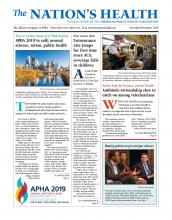With this year’s flu season predicted to be a serious one, disease experts are calling on health workers to help boost vaccine rates.
On Sept. 26, the Centers for Disease Control and Prevention and the National Foundation for Infectious Diseases officially kicked off campaigns to encourage people to get their annual flu vaccinations. A stronger-than-average vaccination rate is needed for what is predicted to be a challenging season, experts said.
“Vaccination is clearly the best way to protect yourself and your loved ones against this really nasty virus,” APHA member Bill Schaffner, MD, medical director of NFID, said at the September news event in Washington D.C. “The recommendation is simple.”
Everyone older than six months should get a flu vaccination annually. But some people are at the highest risk for flu-related complications. They include seniors, pregnant women, young children and people with some chronic health conditions, including asthma, diabetes, heart and kidney disease.
To gain insight on the upcoming U.S. flu season, health officials look to the Southern Hemisphere, where winter and flu season occurs earlier. In Australia, the recent flu season was severe, eclipsing 2017-2018, the country’s previous worst season on record. That season also set records in the U.S., with an estimated 79,000 deaths.
Flu activity also spiked earlier than usual in Australia this season.
In the U.S., clinicians can stay up on case counts, flu strains and pediatric deaths with CDC’s FluView, a weekly surveillance report. The report shares data from labs in all 50 states, the District of Columbia, Guam and Puerto Rico.
A severe flu season and a population that is under-vaccinated poses a major risk to public health and safety. In the 2018-2019 flu season, CDC estimated between 36,400 and 61,200 people in U.S. died from the flu.
According to survey data from NFID, 60% of adults recognize that getting a flu shot is the best way to prevent flu deaths — but only 52% are planning to be vaccinated this season. Among those at high risk, 25% said they were not planning to get vaccinated.
The survey also explored why some adults are skipping their vaccines. About half said they thought the flu shot was not effective enough. About a third were concerned about side effects. And about one-fifth of respondents said they worried about contracting the flu from the flu shot, a belief that is mistaken.
Because there is so much misunderstanding, the experts called on clinicians to talk to their patients and share facts about the flu vaccine.
“Although it’s not perfect, it does completely prevent a lot of disease,” Schaffner told The Nation’s Health. “Even if you get the vaccine and subsequently become ill with influenza, your illness is likely to be milder…and you’re less likely to get those most serious complications — pneumonia, being hospitalized and dying.”
Health providers play an important role in increasing vaccination rate. The survey found that 71% of adults trust their doctors. If health care providers are “diplomatically insistent” that their patients get immunized, as opposed to using vague or suggestive language, rates of vaccinated adults would increase dramatically, Schaffner said.
Patricia Whitley-Williams, MD, president-elect of NFID, said it is particularly important for young children to be vaccinated. This past flu season, vaccine coverage for children was 63%, which is still too low. During the 2018-2019 season, 116 children were reported to have died from flu-related complications, according to CDC.
The way pediatricians present information to parents can boost vaccine rates. Vaccination procedures are more common for pediatricians, so they are being trained to remove “opt-out” language from conversations about vaccines, instead focusing on education, Whitley-Williams said. General practice health care providers could benefit from similar tactics.
“It’s really all in the messaging,” she told The Nation’s Health. “We’re training pediatricians to say ‘no, this is what is going to happen — this is not an option.’”
For more information on the 2019 flu season, visit www.cdc.gov/flu.
- Copyright The Nation’s Health, American Public Health Association












